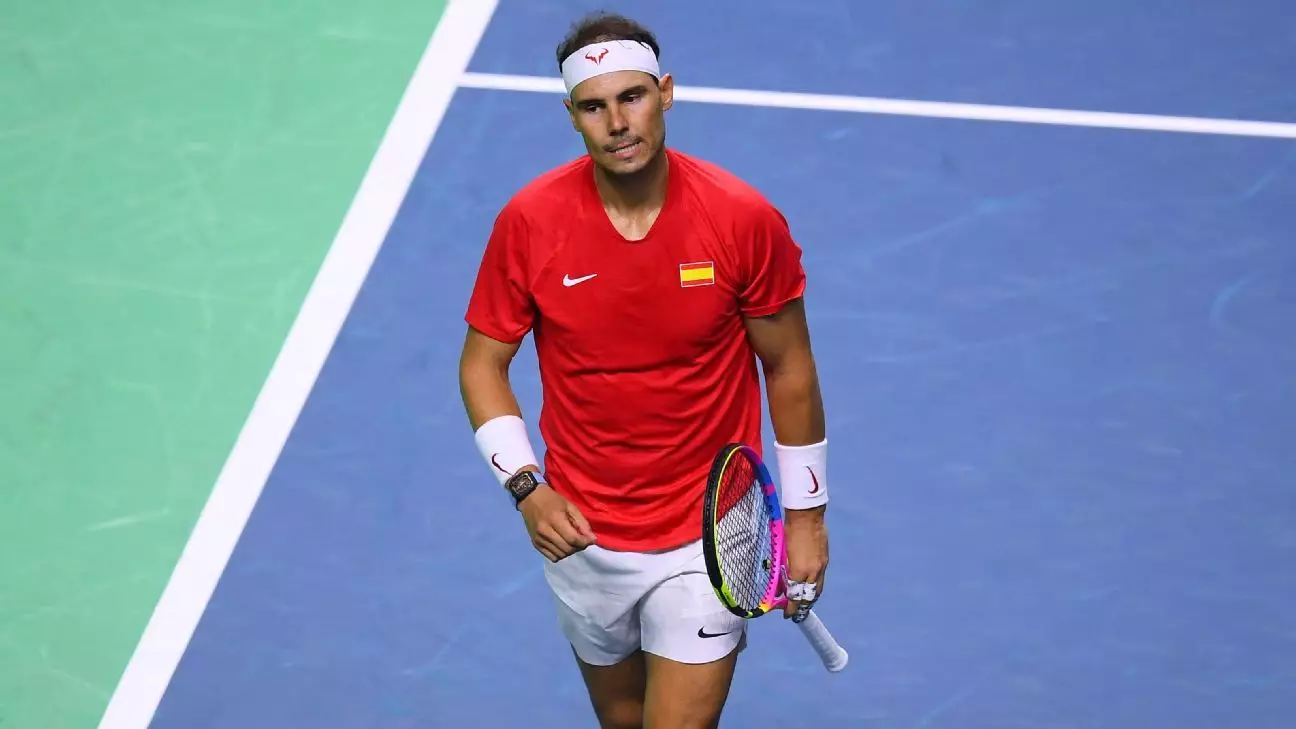Nadal Reflects on His Davis Cup Performance: A Transition to Retirement
There are moments in sports that transcend the game itself, touching on the essence of personal growth and inevitable change. Recently, Rafael Nadal found himself at such a crossroads after his defeat to Botic Van De Zandschulp in the Davis Cup quarterfinals. In a candid moment, Nadal opened up about his feelings towards his career and the looming prospect of retirement. Watching him reflect with such honesty was both moving and thought-provoking, not just for tennis fans but for anyone witnessing an icon in the twilight of their career.
I’ve followed Nadal’s career for years, marveling at his tenacity and spirit on the court. His recent introspection struck a chord with me because it mirrored those universal moments we all face when confronting change. The self-awareness he displayed after his loss is rare in competitive sports, where bravado often overshadows vulnerability. It reminded me of those pivotal life decisions when you must evaluate your path and decide what comes next, a process filled with both fear and hope.
As someone who loves not just tennis but what athletes like Nadal bring to the sport—grace under pressure and unwavering dedication—it was heartening to see him embrace this new chapter with such integrity. You could sense the weight of his words as he acknowledged that he might not be the best choice for Spain moving forward in the tournament. It highlighted his respect for his team and a profound understanding of where he stands within it.
Key Takeaways
- Nadal’s introspective comments reflect a shift in his role within the Spanish national team.
- His humility showcases respect for team dynamics and leadership responsibilities.
- The emotional weight attached to his potential retirement adds complexity to this phase of his career.
A Shift in Perspective
Nadal’s remarks following his match signify a significant transformation in how he views both himself and his role in the Spanish national team. This wasn’t just about assessing his performance; it was about recognizing that sometimes stepping back is necessary for growth—both personally and collectively. The gravity of his reflections suggests a reluctant acceptance of current realities, acknowledging that time may indeed catch up with even the greatest athletes.
The way Nadal openly discussed Spain’s Davis Cup captain, David Ferrer, sheds light on team dynamics that often remain behind closed doors. By deferring to Ferrer’s judgment, Nadal showed deep respect for the hierarchy within the team. It’s a testament to how important it is to prioritize performance over sentimentality, especially when you’re playing at such a high level. This approach underscores not just his maturity but also his commitment to putting the team’s success above personal accolades.

The Balance of Leadership and Legacy
Managing veteran players nearing retirement poses unique challenges for coaches and captains alike. Nadal’s willingness to step aside if it benefits the team highlights both humility and leadership—a combination that’s rare but extremely valuable. It’s not easy for an athlete to critically assess their own performance without bias or emotion clouding their judgment. Yet, here is Nadal doing just that, showcasing why he’s admired beyond his incredible skill set.
His reflections bring into focus how coaches must balance honoring past achievements while making decisions based on present capabilities. This delicate equilibrium can make or break a team’s dynamic, especially when dealing with someone of Nadal’s stature. It serves as an important reminder that sports are as much about relationships and respect as they are about results.
The Emotional Weight of Transition
Nadal’s acknowledgment of losing both this match and what might be one of his final professional outings encapsulates more than just statistics; it draws attention to the emotional narrative interwoven through an athlete’s career. Referring to this chapter as a “closed circle” brings depth to how he perceives this transition—not just as an ending but also a culmination of years filled with triumphs and trials.
The symbolism tied to hearing the national anthem play during one of his last matches is profound. It represents not merely professional accomplishment but also personal identity shaped by decades in competitive sports. The nostalgia mingled with finality adds layers to this moment—a poignant goodbye wrapped in national pride and personal legacy.

Hope Beyond Disappointment
Even amidst recent setbacks, Nadal remains hopeful about Spain’s prospects in the tournament, shifting focus from personal disappointment to team potential. His optimism about teammates’ performances against formidable opponents like the Netherlands exemplifies enduring commitment despite reduced personal capacity. By expressing confidence in others while accepting limitations, Nadal demonstrates grace under pressure—an invaluable lesson in resilience.
A Symbolic Passing of the Torch
Nadal’s support for emerging talents like Carlos Alcaraz symbolizes a meaningful passing of the torch within Spanish tennis. This gesture indicates readiness not only to embrace change but also to nurture future champions who will carry forward the sport’s legacy. It’s about continuity—a seamless transition from one generation of greatness to another—something every athlete hopes for yet few achieve so gracefully.
- Recognize your current position realistically within any team or group setting.
- Prioritize overall goals over individual accolades for long-term success.
- Create space for emerging talents while cherishing established legacies.
- Balance emotional farewell moments with optimism toward future possibilities.
Final Thoughts
Nadal’s ongoing journey through these reflective times offers insights into more than just athletic prowess; it’s about navigating life changes with dignity and perspective. His candidness becomes both an inspiration and a challenge—to evaluate our paths honestly yet hopefully regardless of what stage we find ourselves at professionally or personally.
This transition phase reminds us all why we admire athletes like Nadal—not solely because they excel at their craft—but due largely thanks due largely thanks due largely thanks due largely thanks due largely [CONTINUE FROM HERE]
NadalDavis CupRetirementTennis CareerLeadership


Leave a Reply